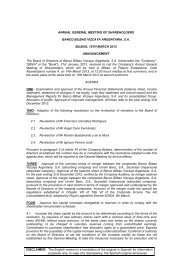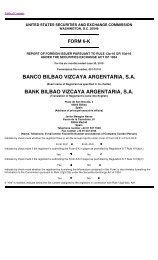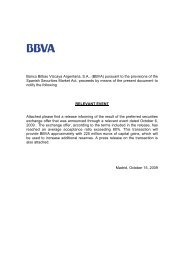BANCO BILBAO VIZCAYA ARGENTARIA, S.A. AND ... - BBVA
BANCO BILBAO VIZCAYA ARGENTARIA, S.A. AND ... - BBVA
BANCO BILBAO VIZCAYA ARGENTARIA, S.A. AND ... - BBVA
Create successful ePaper yourself
Turn your PDF publications into a flip-book with our unique Google optimized e-Paper software.
2.2.22. CONSOLIDATED STATEMENTS OF CASH FLOWS<br />
The indirect method has been used for the preparation of the consolidated statement of cash flows. This<br />
method starts from the entity’s consolidated net income and adjusts its amount for the effects of transactions<br />
of a non-cash nature, any deferrals or accruals of past or future operating cash receipts or payments, and<br />
items of income or expense associated cash flows classified as investment or finance.<br />
For these purposes, in addition to cash on hand, cash equivalents include very short term, highly liquid<br />
investments subject to very low risk of impairment.<br />
The composition of component of cash and equivalents with respect to the headings of the consolidated<br />
balance sheets is shown in the accompanying consolidated cash flow statements.<br />
To prepare the consolidated cash flow statements, the following items are taken into consideration:<br />
• Cash flows: Inflows and outflows of cash and cash equivalents, the latter being short-term, highly<br />
liquid investments subject to a low risk of changes in value, such as balances with central banks,<br />
short-term Treasury bills and notes, and demand deposits with other credit institutions.<br />
• Operating activities: The typical activities of credit institutions and other activities that cannot be<br />
classified as investing or financing activities.<br />
• Investing activities: The acquisition, sale or other disposal of long-term assets and other investments<br />
not included in cash and cash equivalents.<br />
• Financing activities: Activities that result in changes in the size and composition of equity and of<br />
liabilities that do not form part of operating activities.<br />
2.2.23. ENTITIES <strong>AND</strong> BRANCHES LOCATED IN COUNTRIES WITH HYPERINFLATIONARY<br />
ECONOMIES<br />
In accordance with the IFRS-EU criteria, to determine whether an economy has a high inflation rate the<br />
country's economic situation is examined, analyzing whether certain circumstances are fulfilled, such as<br />
whether the population prefers to keep its wealth or save in non-monetary assets or in a relatively stable<br />
foreign currency, whether prices can be set in that currency, whether interest rates, wages and prices are<br />
pegged to a price index or whether the accumulated inflation rate over three years reaches or exceeds<br />
100%. The fact that any of these circumstances is fulfilled will not be a decisive factor in considering an<br />
economy hyperinflationary, but it does provide some reasons to consider it as such.<br />
Since the end of 2009, the Venezuelan economy is considered to be hyperinflationary as defined by the<br />
aforementioned criteria. Accordingly, as of June 30, 2010 and December 31, 2009, it was necessary to<br />
adjust the financial statements of the Group's subsidiaries based in Venezuela to correct for the effect of<br />
inflation. Pursuant to the requirements of IAS 29, the monetary headings (mainly loans and credits) have not<br />
been re-expressed, while the non-monetary headings (mainly tangible fixed assets) have been re-expressed<br />
in accordance with the change in the country's Consumer Price Index.<br />
The historical differences as of January 1, 2009 between the re-expressed costs and the previous costs in<br />
the non-monetary headings were credited to "Reserves” on the consolidated balance sheet for 2009, while<br />
the differences for 2009, and the re-expression of the income statement as of December 31, 2009 were<br />
recognized in the consolidated income statement for 2009.<br />
The effects of inflation accounting in Venezuela in the consolidated income statement corresponding to the<br />
six months ended June 30, 2010 were not significant.<br />
In January 2010, the Venezuelan authorities announced the devaluation of the Venezuelan bolivar with<br />
regard to the main foreign currencies and that other economic measures will be adopted. The effects of this<br />
devaluation in the consolidated income statement corresponding to the six months ended June 30, 2010 and<br />
on consolidated equity were not significant.<br />
36
















